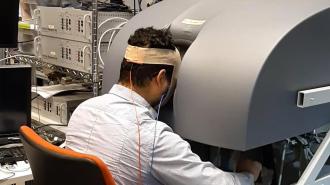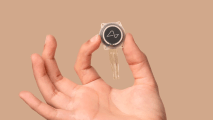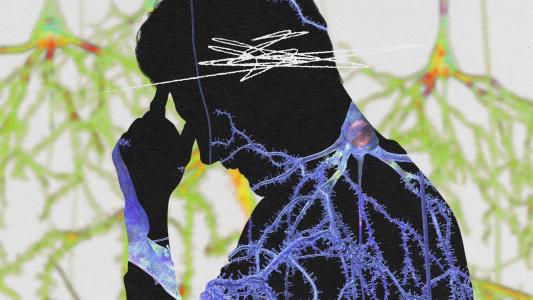Brain stimulation could boost learning
Applying a painless electric current to the back of a person’s head while they learn a new task in VR can improve their performance in the real world, according to a small study out of Johns Hopkins University.
The challenge: Simulating surgery in VR can help doctors practice the operation without putting patients’ lives at risk. However, going from VR to the OR isn’t simple.
“Training in virtual reality is not the same as training in a real setting, and we’ve shown with previous research that it can be difficult to transfer a skill learned in a simulation into the real world,” said Jeremy D. Brown, a roboticist at Johns Hopkins University (JHU).
“The group that didn’t receive stimulation struggled a bit more to apply the skills they learned.”
Guido Caccianiga
What’s new? In a new study, Brown and his colleagues demonstrate how electrically stimulating a person’s brain while they learn to control a surgical robot in VR simulations can improve their performance when they’re given control of the robot in the real world.
“The group that didn’t receive stimulation struggled a bit more to apply the skills they learned in virtual reality to the actual robot, especially the most complex moves involving quick motions,” said researcher Guido Caccianiga. “The groups that received brain stimulation were better at those tasks.”
The details: During their study, the JHU team placed small electrodes on the backs of 18 volunteers’ heads. This allowed them to noninvasively stimulate the cerebellum, a part of the brain that plays a key role in learning new movements.
The volunteers, who didn’t have any experience in surgery or robotics, were then trained to use a surgical robot to lace a needle through three tiny holes, an exercise that mimics movements a surgeon might make during an operation.
This training took place in VR, and half of the participants received brain stimulation for the duration of it, while the others’ brains were stimulated only briefly at the beginning.
The volunteers were then challenged to perform the task using an actual surgical robot, and according to the researchers, those who’d received the extended simulation were better at it.
“It’s very hard to claim statistical exactness, but we concluded people in the study were able to transfer skills from virtual reality to the real world much more easily when they had this stimulation,” said Brown.
Looking ahead: This isn’t the first study to claim a link between brain stimulation and enhanced learning, and the researchers acknowledge the need for larger studies to validate their finding that brain stimulation can improve VR training.
However, if the results hold up, they believe brain stimulation could one day be used to speed up training for doctors and others learning new skills in VR.
“What if we could show that with brain stimulation you can learn new skills in half the time?” said Caccianiga. “That’s a huge margin on the costs because you’d be training people faster.”
We’d love to hear from you! If you have a comment about this article or if you have a tip for a future Freethink story, please email us at [email protected].






